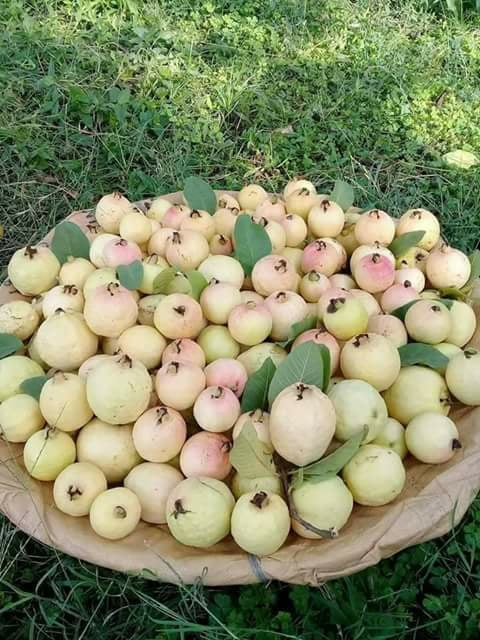
Guava (Amrood)
Guava (amrood) is a fruit. It scientific name is Psidium Guajava. Guava is cultivated twice in a year. Guava is very useful for flu, cough, digestion problem, cholesterol, allergy, piles, blisters in mouth, constipation and more. It leaves are use for making medicines. Guava is very tasty to use with salt and black pepper. It do not use in empty stomach. Guava is better to eat after lunch or dinner. It is one of the tropical fruit. Guava is a sensitive fruit. It has rich in Vitamin C and fiber. 100 gram Guava has 76-gram water, 1.6 % protein, 0.2 % Fats, 0.1 % calcium, 0.4 % Phosphorus, 1 mg Fiber, 100 – 300 mg Vitamin C and 0.5 % potassium. It has round and oval in shape, little bit bitter in taste, otherwise sweet in taste. The outer skin of Guava is rough and inner is soft and hard both. so please sugar patient first take advice to your Doctor then use any tips, In this page, you can see Guava benefits In Urdu ( Amrood Ke Faide ) in Roman Hindi.

Have not all of us enjoyed a plateful of guavas sprinkled with chaat masala atop? Nothing else can match up to the luscious jams, jellies and murabbas laced with an intoxicating strong-sweet fragrance. Undeniably, it is one fruit which always got enough lauding from our grandmothers. Guava, popularly known as amrood in Hindi, comes loaded with tiny hard seeds at the center. It is believed to have its genesis in Central America where it is alternatively known as "sand plum". It is round or oval in shape with light green or light yellow skin, and the colour of its flesh varies from white or pink to dark red and has edible seeds.
Besides its unique flavour and fragrance, guava has been hailed as one of the super fruits due to the numerous health benefits it offers. It indeed is a powerhouse of nutrients. “This humble fruit is extraordinarily rich in vitamin C, lycopene and antioxidants that are beneficial for skin. Guavas are also rich in manganese which helps the body to absorb other key nutrients from the food that we eat. Guavas contain folate, a mineral which helps promote fertility. The potassium in guavas helps normalise blood pressure levels as well. In fact, a banana and a guava contain almost the same amount of potassium. Since it contains about 80% of water it helps keep your skin hydrated”, says Dr. Manoj K. Ahuja, Sukhda Hospital. Here are 15 mind-blowing guava benefits for health and skin you need to know.

Guava for Health
Immunity Booster
Did you know: Guavas are one of the richest sources of vitamin C? It’s true. Guavas contain 4 times the vitamin C content present in oranges. Vitamin C helps improve immunity and protects you against common infections and pathogens.Lowers Risk of Cancer
“Lycopene, quercetin, vitamin C and other polyphenols act as potent antioxidants which neutralise free radicals generated in the body, preventing the growth of cancer cells. Guavas have shown to be widely successful in reducing prostate cancer risk and also inhibit the growth of breast cancer cells since it is rich in lycopene”, says Dr. Manoj K. Ahuja.Diabetes-Friendly
Due to the rich fibre content and low glycaemic index, guavas prevent the development of diabetes. While the low glycemic index inhibits a sudden spike in sugar levels, the fibre content ensures the sugar levels are well regulated.
15 Amazing Benefits Of Guava
de Deutsch
The potential health benefits of guava include its ability to help in preventing cancer, regulating blood pressure, and treating diarrhea. It also aids in weight loss, improves the skin, treats cough and cold, constipation, dysentery, and scurvy.
Table of Contents
What is a Guava?
Guava Nutrition Facts
Health Benefits of Guava
Prevents Cancer
Antioxidant Properties
Controls Diabetes
Improves Eyesight
Regulates Blood Pressure
Improves Thyroid Health
Treats Scurvy
Eliminates Diarrhea & Dysentery
Relieves Constipation
Improves Brain Health
Treats Cough & Cold
Weight Loss
Skin Care
Reduces Oxidative Stress
Dental Care
Uses of Guava
Guava FAQs
What Is A Guava?
Guava is a sweet and delicious fruit cultivated in the tropical climates. This seasonal fruit, scientifically known as Psidium Guajava, is round or pear-shaped and is light green, yellow or maroon in color when it ripens. It has a white or maroon flesh, depending on its type, and has small hard seeds enveloped in its soft, sweet pulp. The common types of guava include apple guava, yellow-fruited cherry guava, strawberry guava, and red apple guava. It is mostly eaten raw (ripe or semi-ripe) or consumed in the form of juice, jams, and jellies.
Guava’s believed to have originated from Mexico or Central America. It is now very popular in Asian countries and is also increasingly available in the American countries, particularly after its health benefits have been revealed.
What makes guava special is that increasing the shelf life of this fruit does not require excessive use of chemicals or pesticides as in the case of grapes, apple, and other “exotic” fruits. It is one of the least chemically treated and sprayed fruits.
Guava Nutrition Facts
This popular fruit is a powerhouse of nutrients. Guava is a good source of energy, dietary fiber, and vitamins such as vitamin A, vitamin C, niacin, vitamin B-6, folate, thiamine, and riboflavin. It also contains essential minerals like calcium, phosphorus, magnesium, iron, and potassium.
Health Benefits Of Guava
If the traditional adage says that, “an apple a day keeps the doctor away,” in Europe and America, the phrase can be probably changed to, “a few guavas in the season keep the doctor away for the whole year,” in the tropical and subtropical regions of the world where they typically grow. Let’s find out why;
Prevents Cancer
One of the most important benefits of adding guava to your diet is its ability to inhibit the growth and metastasis of cancerous cells. There have been numerous studies done in recent years on guava’s effects primarily on prostate, breast, and oral cancers. Guava leaf oil acts as an antiproliferative and has actually proven to be more effective than some leading modern medicines in reducing cancer cell growth. Guavas are also rich in lycopene, a powerful antioxidant that can reduce prostate cancer risk. The same antioxidant has also shown its efficacy in inhibiting the growth of breast cancer cells, though more tests are to be done to support this finding.Guava2
Antioxidant Properties
The naturally high content of vitamin C in guavas, which is four times higher than the content found in oranges (the traditional vitamin C powerhouse), helps to boost the immune system. Antioxidants are the major lines of defense against the proliferation of free radicals in the body, which are one of the main causes of serious conditions like cancer and heart diseases. Therefore, adding guava to your diet helps you stay healthy.
Guava juice is also available.

Controls Diabetes
The intake of guava can also help patients suffering from diabetes. High level of dietary fiber in it helps lower blood glucose levels in the body. Studies have shown that consuming it can help prevent the appearance of type-2 diabetes.
Improves Eyesight
Guava is an extremely good source of vitamin A, which is well known as a booster for vision health. It can help slow down the appearance of cataracts, macular degeneration and improve the overall health of the eyes. It helps protect the cells in your eyes and can also prevent deterioration of eyesight.
Regulates Blood Pressure
Guava helps reduce cholesterol in the blood and prevents it from thickening, thereby maintaining the fluidity of blood and reducing blood pressure. Studies have shown that the food that lacks fiber (such as refined flour) adds to blood pressure. This fruit, being very rich in fiber and hypoglycemic in nature, helps to reduce blood pressure.
Improves Thyroid Health
Guava is are a good source of copper, which is important for regulating metabolism by helping to control hormone production and absorption. The thyroid hormones play a significant role in energy regulation and metabolism in the body. So guava can help maintain your health in many ways.
Treats Scurvy
Guava can outdo many fruits, including orange and other citrus fruits, in terms of its concentration of vitamin C. A deficiency of vitamin C can cause scurvy and the only known remedy for this dangerous disease is proper intake of vitamin C. In fact, guavas contain 4X more vitamin C than oranges, which are often heralded as the absolute best source of that beneficial vitamin.
Eliminates Diarrhea & Dysentery
Guava has astringent properties that help treat a number of digestive disorders like diarrhea and dysentery. Either you chew guava leaves or eat a raw guava, the astringent qualities add substance to loose bowels and reduce the symptoms of diarrhea. These astringents are alkaline in nature and have disinfectant and anti-bacterial properties, thus helping to cure dysentery by inhibiting microbial growth and removing extra mucus from the intestines. Furthermore, other nutrients in guava such as vitamin C, carotenoids and potassium, strengthen the digestive system while simultaneously disinfecting it. Guava is also beneficial in treating gastroenteritis for the same reasons stated above.
Relieves Constipation
Guava is one of the richest sources of dietary fiber among fruits and its seeds serve as excellent laxatives. These two properties of guava help the formation of healthy bowel movements, aid in retaining water in the body and thoroughly cleaning your intestines. It is said that constipation alone can lead to 72 different types of ailments, so any help for constipation is beneficial. Your overall health undeniably is affected by proper digestion, and more importantly, proper excretion. Frequent consumption of guava can ensure both.
Improves Brain Health
Another tremendous benefit of guava is the presence of vitamin B3 and B6 in them. Vitamin B3 (also known as niacin) can increase blood flow and stimulates cognitive function, whereas vitamin B6 is a great nutrient for brain and nerve function. Eating guava can help relaxing the nerves and enhance concentration.

Treats Cough & Cold
Juice of raw and immature guavas, or a decoction of its leaves, is very helpful in relieving coughs and colds by reducing mucus, disinfecting the respiratory tract, throat, and lungs, and inhibiting microbial activity with its astringent properties. Guava has one of the richest sources of vitamin C and iron among fruits and both effectively prevent colds and viral infections. In some areas of India, roasted ripe guava is used as a remedy against extreme cases of cough, cold, and congestion. Ripe guava should be avoided by people who are suffering from cough and cold, as it can exacerbate the problem. Also, avoid drinking water immediately after eating guava as it can lead to a sore throat.guava_1
Weight Loss
Guava is very helpful for people wanting to lose weight without compromising their intake of proteins, vitamins, and fiber. As guava is high in roughage, it has no cholesterol and has a low number of digestible carbohydrates. This combination makes a filling snack that satisfies the appetite very easily. Guava, especially the raw one, has far less sugar as compared to apples, oranges, grapes, and other fruits. Add a medium-sized guava to your lunch and you will not feel hungry until evening. Ironically, it can also help lean and skinny people to gain weight. This is probably due to its wealth of nutrients, which regulates the metabolism and promotes proper absorption of nutrients.
Skin Care
Guavas can improve the texture of your skin. They can help you to avoid skin problems better than beauty creams and skin toning gels. This is chiefly due to the abundance of astringents available in the fruit (more astringent is present in immature guavas) and in its leaves. Your skin can benefit from either eating the fruits (this helps tighten your muscles apart from your skin) or by rinsing your skin with a decoction of its immature fruit and leaves. It will tone up and tighten the area of loosened skin where it is applied. Guava’s rich antioxidants and detoxifying properties help keep your skin glowing and free from signs of premature aging, wrinkles, and other dermal disorders.
Reduces Oxidative Stress
Guava juice is rich in vitamin C and a number of other important phytonutrients that can help eliminate free radicals and slow down oxidative stress in the body. It is a very popular beverage in tropical and subtropical regions. Furthermore, guava juice can help balance blood sugar, thus lowering your risk of developing diabetes.
Dental Care
Apart from guava fruit, the leaves also have many benefits. The juice of guava leaves has been known to cure toothaches, swollen gums & oral ulcers, and it speeds up the healing process of wounds when applied topically. Finally, it reduces the frequency of convulsions, epilepsy, and bacterial infections.
When consuming guava for medicinal purposes, you must perform your due diligence, and be cautious while adding any new medicinal form of guava to your diet. It is better to stick to eating guava in its natural form as a raw fruit.
Uses Of Guava
Guava leaves are used in the preparation of herbal medicines to treat several diseases like diarrhea, diabetes, infections, and obesity. The leaves of guava have been an important constituent in folk medicines as these contain palmitic acid and palmitoleic acid. Intake of guava seeds also helps treat common problems like constipation and other gastrointestinal issues. It works as laxatives as it contains a lot of dietary fiber. It can help to bulk up your stool and will pass through your system without any problem.
Guava FAQs
What is a Guava?
A guava is a tropical fruit that is found most often in tropical and subtropical areas and is rarely grown in temperate climates. With the scientific name of Psidium guajava, this fruit is one of many similar species in the same genus, but “apple guava” is the common form found in most markets around the world. They are roughly the size of apples or slightly smaller, and some variations are similar to plums in size and shape.
How to Eat a Guava?
Pick a fresh, ripe guava that does not have any blemishes.
Wash the fruit under running water.
Cut the guava into small pieces. If you want you can scoop it out using a teaspoon.
Enjoy the fruit by seasoning it with salt, pepper, sugar or vinegar.
There are plenty of ways to consume a guava, ranging from juicing the fruit and drinking it as a beverage, slicing it, and putting it on top of ice cream to jams and jellies, or including it in your next veggie or fruit smoothie. Adding sliced guava-cubes to your salad can make a healthy breakfast.
Can you eat Guava seeds?
Yes, you can eat guava seeds without any negative effects. In fact, people intentionally eat the seeds because they help with gastrointestinal issues, such as constipation, because there is a lot of dietary fiber in these seeds. They can help to bulk up your stool and will pass through your system without any problem.
What is Guava good for?
Guava helps to protect the immune system, regulate blood pressure, and lower the risk of diabetes. It further helps to strengthen the digestive system. Due to the unique and high concentrations of minerals and vitamins, guava can also help increase energy, relax the nerves and decrease the number of stress hormones in the body.
How to grow Guava?
If you live in a tropical or subtropical region, growing your own guava tree actually isn’t that tough. Guava trees respond very well to mulch, so clear out a 2-3 inch space in the soil where you can plant the tree. Then, water the tree once a week and fertilize the tree once a month. Adding more mulch is required, but the tree should grow rather quickly. Thinning out excess branches can also promote more growth.
How many calories does Guava contain?
One of the best things about guava is the low level of calories – only 38 calories in an average fruit. Given the impressive amount of minerals, vitamins, and phytonutrients that are found in guava, this low-calorie count is what so many people love about this fruit. It can provide energy and the nutrients needed to get through the day, without increasing the number of calories.
What to do with Guava?
Guava should be halved and then the fibrous center and the seeds can be removed. The seeds can be saved and used later as a stomach cleanser. The fruit can then be used as a topping or eaten raw, made into candies or jellies, or blended in a fruit/vegetable smoothie. Alternatively, guava can be juiced, making a delicious and healthy beverage.
Where does Guava come from?
Guava comes from the guava tree, a species native to Central America and Mexico. These fruiting trees actually come in many different species, but all of them do best in tropical or subtropical regions. Since guavas have been found to not only be delicious, but also highly beneficial to human health, these fruits have been exported all over the world, but guava cultivation and consumption is still centered in the tropics.
Hi! I am a robot. I just upvoted you! I found similar content that readers might be interested in:
https://www.organicfacts.net/health-benefits/fruit/health-benefits-of-guava.html
Really good article, sadly didn't see it earlier.